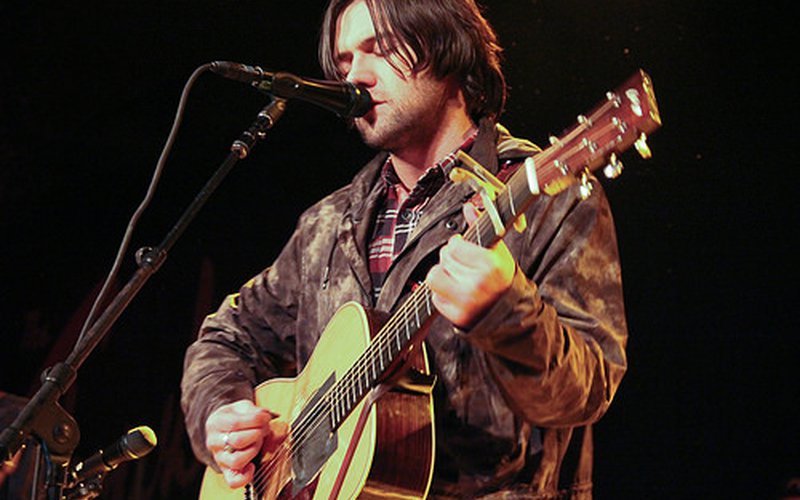
Conor Oberst has spent an entire career fighting against expectations. Even if he wasn't saddled with the "new Dylan" tags upon his emergence in the early 2000s, there undoubtedly still would have been a focus on his age (20 at the release of Bright Eyes' 2000 breakthrough Fevers and Mirrors), his roots (his involvement with the then-burgeoning Omaha, Nebraska Saddle Creek scene), his politics (he was heavily involved in 2004's Vote for Change tour and famously released the Bright Eyes single "When The President Talks To God" for free long before free downloads were commonplace) or some other non-musical aspect of his life. But, maybe for the first time in his career, Oberst is touring an album, this year's very good Upside Down Mountain, that isn't preceded by the reputation of Oberst's career up to that point. It's not the solo album he used to escape the Bright Eyes name (Conor Oberst), the one he made after he got famous (Bright Eyes' Cassadaga), and not the Bright Eyes comeback album (The People's Key). It's just the latest Conor Oberst solo album, and that's key for him, because without the usual level of overbearing career context, Oberst was able to draw from his entire songbook to deliver a two-hour set that found him as engaging and potent as he's ever been.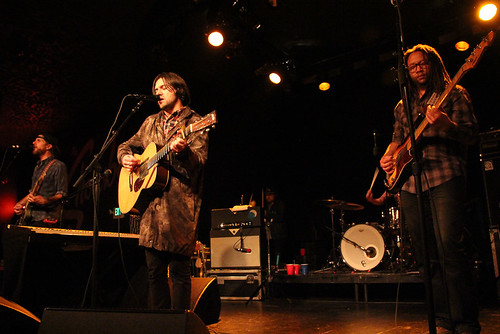
For the majority of the tour, Oberst was backed by the members of the Los Angeles folk rock band Dawes, but as that group left the road to start work on their next album, another Los Angeles staple, and Upside Down Mountain's producer, Jonathan Wilson stepped for them in as bandleader and opening act for the jaunt's final leg. Wilson's opening set was, in many ways, the antithesis of Oberst's. For the better part of an hour, Wilson's whispery vocals, extended jams, and overall relaxed demeanor – descriptors that could certainly not be used to describe forthcoming Oberst's emotional tour de force – floated over the Showbox, slipping into ten minute long grooves as he and his band performed cuts from 2011's Gentle Spirit and 2013's Fanfare. Wilson is just as apt as a musician as he is a producer, and his set not only stood on its own as a fine performance, but also gave some insight into what elements went into Upside Down Mountain, arguably Oberst's most relaxed batch of songs in some time. During Wilson's set, it was plain to see his influence on the crisp, subtly meticulous tones behind "Hundreds of Ways" and "Artifact #1", and as a bandmate, he worked as a fitting foil to Oberst, augmenting Oberst's rhythm parts with tasteful leads and pairing with Oberst's frequent partner in crime (and Bright Eyes bandmate) trumpeter/keyboardist Nate Walcott in pushing the band to melodic climaxes when the songs called for one.
Jonathan Wilson:
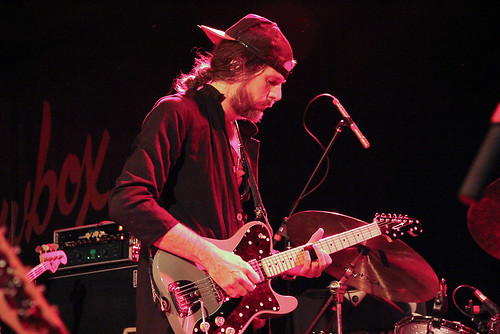
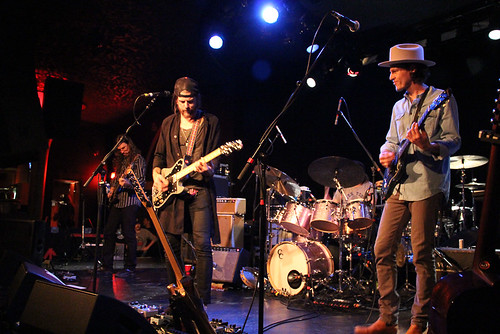
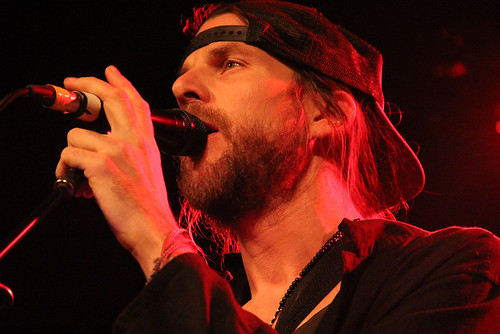
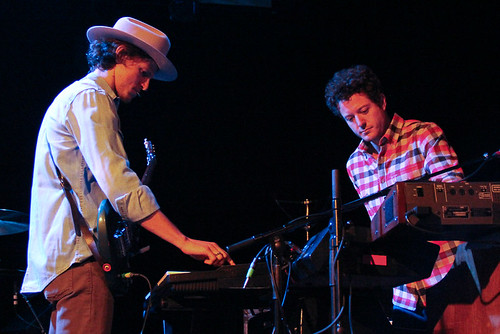
Although Upside Down Mountain is Oberst's most subdued album since 2007's Cassadaga, the album's muted atmosphere rarely came through in the set. The Upside Down Mountain songs in the set were often given an extra, electric guitar-driven punch ("Zigazagging Towards The Light", "Enola Gay") or a cutting starkness when performed by Oberst alone. The latter approach remained a reliable move for Oberst, who has long flourished as a songwriter and a performer when accompanied only by piano or an acoustic guitar. "Ladder Song", "Cape Canaveral", and "Common Knowledge" received the coveted solo spots on the setlist on Tuesday night, with the latter chosen to close the main set, framing the devastating Upside Down Mountain finisher with even more solemnity. Similarly tempered Oberst solo cuts flanked the Upside Down Material ("Moab", "Sausalito"), creating a thematically even-keeled set that thrived in the midtempo range, the band chugging along while Oberst rattled off (mostly) mediations on finding contentment after a long, wearying journey. That being said, one of the show's highlights was a snarling, fiery closing performance of the oft-overlooked "Roosevelt Room", one of Oberst's best political diatribes that paired perfectly with a not-so-subtle criticism of a certain software company.
If the solo material in the set was where Oberst – the New York-via-Omaha seasoned troubadour – is now, the Bright Eyes material was a reminder of where Oberst – the precocious, politically charged, personally embattled songwriting prodigy – came from. Even though this is nominally a tour behind Conor Oberst solo material, a large portion of the set was from the Bright Eyes catalog, which found new life in the context of being placed directly next to songs from the last few years of Oberst's career. (Producer Mike Mogis and Walcott are considered the other two permanent members of Bright Eyes, but Oberst has always been its driving force.) Framed as chapters from the Conor Oberst songbook, the nine Bright Eyes songs that Oberst and co. aired in the set showed just how broad and singular Obert's songwriting voice has been over the past fifteen years. The same man who wrote the patiently optimistic "Hundreds of Ways" is the same that wrote the still stunningly caustic "The Calendar Hung Itself..."., and even if he's shaken off the demons that led him to write the latter, he can still tear through it like he's still a drunk, angry twentysomething. Likewise, the three songs played from I'm Wide Awake, It's Morning, perhaps Oberst's crowning achievement, remain just as powerful as they were at the time of their release, and Oberst delivered them with the same introspective pining that fills the recorded versions. More importantly, those tracks in particular were the ones that bridged Oberst's past and present in the set. Sonically, they operate in the country-influenced vein that Oberst has long pulled from, but thematically, they're the ones that most vividly capture the Oberst who led Bright Eyes out of Omaha and into indie rock stardom, and placed next to the Upside Down Mountain songs, they paint a picture of how far Oberst has come personally. As a songwriter, he remains a sharp, inimitable figure, but as a person, he seems more content, but not complacent, than ever. In one of his few onstage remarks that wasn't praise for Jonathan Wilson – Oberst was really excited to have him there – Oberst told the story of the first time he played the Showbox, all the way back in 2001 as the opening act for Death Cab For Cutie's album release show for The Photo Album. Flown out while not on tour to perform solo and acoustic, Oberst said that he remembers nothing about the gig except being completely terrified. Conversely, the Oberst who was telling that story on a cool Tuesday night seemed anything but terrified. Confident, articulate, and vibrant, Oberst seems to be more content than ever with the paths he's traveled, willingly resurfacing snapshots of his journey, if only to show how far he's come. His intact ability to cut through a room to a listener with his voice and lyrics remains intact, and despite a thousand great lines being sung that night, one lyric stood out above the rest as a thesis statement for the evening: "there's nothing that the road cannot heal."
Conor Oberst:
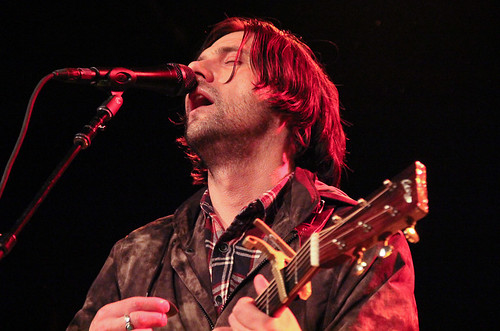
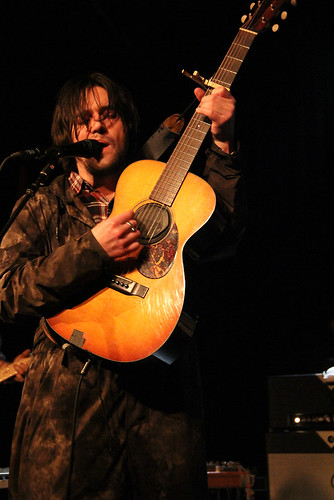
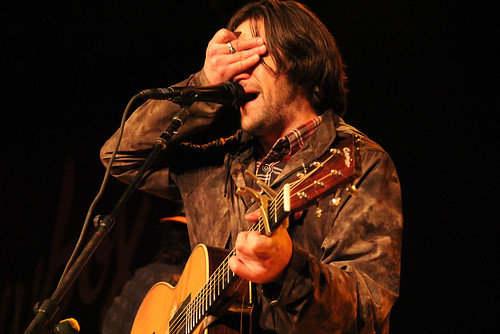
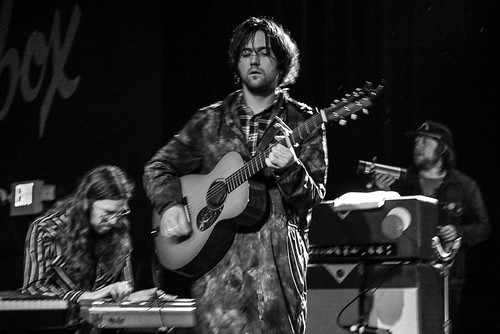
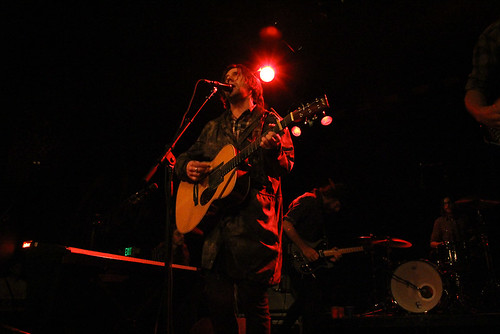
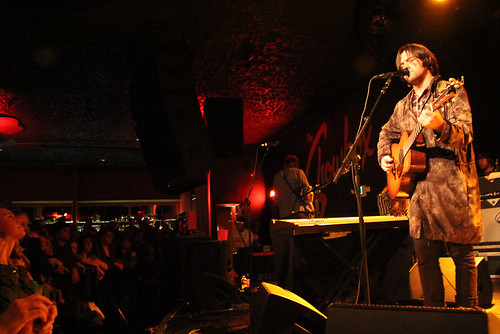
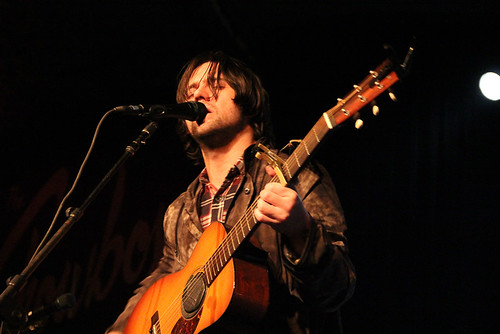
In the Nordstrom Recital Hall during Decibel Festival's Optical 4 showcase, the sound of WIFE was equal parts exciting and heavy - the sound was swelling with an emotional intensity unparalleled, and the room felt thick with listening. Visuals tracked through architectural yet emotive abstractions …
Closing up Decibel Festival is no small task, but if anyone is up to the task and still ready to party after four previous nights of madness, it's LA hip hop collective Friends of Friends. The group houses a brilliant group of young musicians, specializing in electronic, trap, hip-hop, and experime…